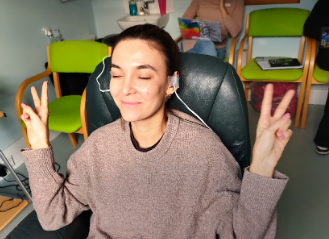There has been an explosion of interest in brain stimulation for a plethora of conditions with research showing proven benefits in depression, migraine, epilepsy and other neurological conditions such as stroke, and low awareness state. Current interest has widened the focus on long-term neurodegenerative conditions such as Alzheimer’s and Parkinson’s disease.
NIBS differs from deep brain stimulation (DBS) in that no surgery, anaesthetic, or hospital stay is involved. NIBS is performed by applying electrodes to the scalp and introducing low voltage, small current flows to the brain in specified locations targeting specific cranial nerves, or brain regions. At PCIT, members have had the opportunity to participate, since October 2023, in research currently ongoing with NIBS using dual vestibular and vagal nerve stimulation. Over 60 participants to date have volunteered for the study with initial results showing that the technique is safe, practical to do, and well-tolerated by participants. It is too early to say whether after only one stimulation session there are any clinical benefits but the current study is focussing on biophysical measures of change (heart rate variability). The successor study in early January 2024 will expand to use multiple stimulation sessions to look for biophysical as well as clinical improvement.
Any person with Parkinson’s disease is eligible to take part, but also must meet specific eligibility criteria including good ear health, and absence of any prior neurological condition such as stroke or brain surgery. The participants are all assessed initially using a range of motor and non-motor screening measures such as cognition, mood, sleep, fatigue, and specific Parkinson’s movement disorder scales. They then attend for stimulation which involves preparing the skin and ears for the electrodes that are used to apply the currents used in the study. A student volunteer is shown having stimulation in the picture above. The procedure lasts 40 minutes, is comfortable, and relaxing, and to date no-one has reported any untoward effects.
Volunteers are still required so if you are interested in taking part, please contact Vicki Hazeldine (vicki@drbodani.com) for inclusion. The research is being
led by Dr Mayur Bodani, Consultant Neuropsychiatrist, and is being supervised by Professor David Wilkinson, at the University of Kent.
We would like to thank the Robert Luff Foundation for funding the NIBS device used for this study.


I am interested in taking part in NIBS for Parkinson;s